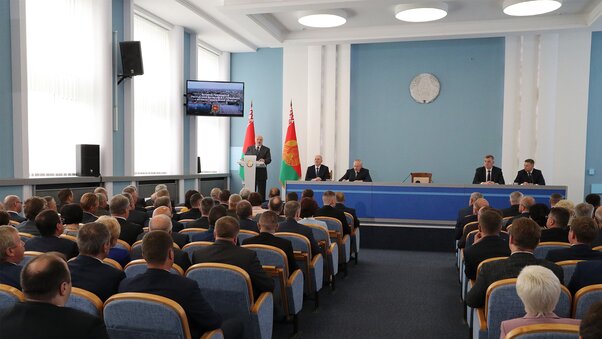Meeting with senior executives of Brest Oblast
- 27
- 2
Belarus President Aleksandr Lukashenko met with senior executives of Brest Oblast on 22 June.
The head of state noted: “I should say I’ve been here before. It is my city. I know every little street of that Soviet city. I walked every square meter here, particularly in the last few years of the active military service when I had to take care of public and political work. My entire military life revolved around the protection of the city and of our huge country back then.”
In his words, back then Brest was quite heartwarming and parochial in his eyes, a city that did not look much like an oblast capital. “But look and see how beautiful our legendary city upon Bug has become. We decently celebrated its 1,000th anniversary last year. The fact that today’s Brest is a genuine European city – clean, comfortable, and very convenient for life – has been noted not only by residents but also foreign guests,” Aleksandr Lukashenko said.
He noted that tourism in western parts of Belarus skyrocketed when visa-free travels were introduced although not all the neighboring countries were in favor of Belarus’ decision. “But we are an open country. It is profitable for us. We will continue this practice,” the head of state stated.
Aleksandr Lukashenko said: “They say that big things can be properly appreciated only from some distance away. They are right. In the years of sovereign development, we’ve made a huge step forward in the manufacturing sector, agriculture, technologies, and social sphere. It is particularly noticeable in Brest Oblast. Some locals are now casting aspersions on those accomplishments, talk about lost years. They claim the current government has led the country into a dead end, that there are problems everywhere. You should be understanding about it. Maybe even calm. It is only natural; a political fight is in progress. But numbers cannot lie. And they vividly testify to the contrary.”
Speaking about the development of the region in the past years, Aleksandr Lukashenko noted that the industrial output had increased by 5.5 times, with merchandise export up by nearly 7 times to $2.6 billion. Absolutely new major enterprises were built in fish industry, dairy industry, and chemical industry. Woodworking industry received an additional impulse. “Many of those enterprises are privately owned,” the head of state noted.
Aleksandr Lukashenko recalled his visit to the Baranovichi-based cotton yarn manufacturer Blakit during his early presidential years. Over 9,000 employees of the company had no salaries back then. “It was one of the first enterprises I’d visited. Primarily because it was a women’s enterprise. It was a double catastrophe for me that women could not feed their kids. No raw materials meant no work. I had to promptly resolve the problem with our Uzbekistani friends, who supplied cotton to us. The current situation at the enterprise may not be ideal but it is totally different,” Aleksandr Lukashenko said. In particular, equipment has been renewed with assistance of the government. The company has also mastered technologies for digital printing on cotton cloth.
“The aircraft repair factory in Baranovichi is one of the best enterprises of ours. If it didn’t have problems with Russia, which makes the company’s life difficult from time to time with regard to deliveries of components for repairs and the modernization of aerial units, the company would live quite well. The factory fulfils most complicated orders for the army and civilian customers. And there is already a line of foreign customers waiting for their orders to be fulfilled,” Aleksandr Lukashenko noted.


